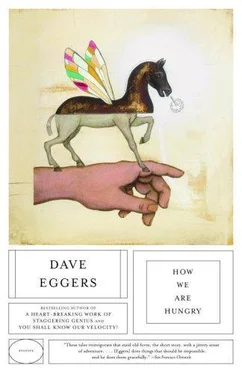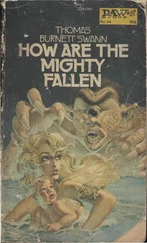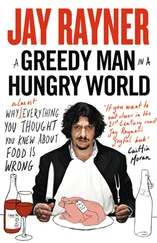Dave Eggers - How We Are Hungry
Здесь есть возможность читать онлайн «Dave Eggers - How We Are Hungry» весь текст электронной книги совершенно бесплатно (целиком полную версию без сокращений). В некоторых случаях можно слушать аудио, скачать через торрент в формате fb2 и присутствует краткое содержание. Год выпуска: 2005, Издательство: Vintage Canada, Жанр: Современная проза, на английском языке. Описание произведения, (предисловие) а так же отзывы посетителей доступны на портале библиотеки ЛибКат.
- Название:How We Are Hungry
- Автор:
- Издательство:Vintage Canada
- Жанр:
- Год:2005
- ISBN:нет данных
- Рейтинг книги:3 / 5. Голосов: 1
-
Избранное:Добавить в избранное
- Отзывы:
-
Ваша оценка:
- 60
- 1
- 2
- 3
- 4
- 5
How We Are Hungry: краткое содержание, описание и аннотация
Предлагаем к чтению аннотацию, описание, краткое содержание или предисловие (зависит от того, что написал сам автор книги «How We Are Hungry»). Если вы не нашли необходимую информацию о книге — напишите в комментариях, мы постараемся отыскать её.
A Heartbreaking Work of Staggering Genius
How We Are Hungry — читать онлайн бесплатно полную книгу (весь текст) целиком
Ниже представлен текст книги, разбитый по страницам. Система сохранения места последней прочитанной страницы, позволяет с удобством читать онлайн бесплатно книгу «How We Are Hungry», без необходимости каждый раз заново искать на чём Вы остановились. Поставьте закладку, и сможете в любой момент перейти на страницу, на которой закончили чтение.
Интервал:
Закладка:
NAVEED
STEPHANIE IS in her own bedroom, among her things, and in her bedroom is James, whom she knows through friends and who has perfect forearms. Tonight they found themselves the last two at a party for a friend, who is leaving the country to go to Bolivia to raise llamas, or perhaps coffee. They are now in her bedroom, Stephanie and James, because they like each other a great deal, especially tonight, when his forearms looked truly exceptional. But James is only in Stephanie’s city for one more week, at which time he will leave for Oregon to live as a forest-fire watchman of some kind. The point is that together they have no future, but Stephanie badly wants to have sexual intercourse with James. But if she does, James will bring her total number of sexual partners up to thirteen, which is, she thinks, too many. Not too many for herself — for she regrets only two of the men in question, both named Robert, both with too much back-fat — but too many for whomever she finally marries. She can already hear the conversation, a year or five years hence, with the man of her future, whoever he may be — he too will have amazing forearms — when after much fumbling and guessing and suspecting, they finally agree to exchange information about past partners: numbers, names, frequency, locales. And she knows now that thirteen will seem excessive. She believes that even twelve, where she is now, seems too much, will likely scare off a man who is not very secure in himself. But thirteen is something else, with other, more sinister complications. Thirteen is a baker’s dozen, and it is this phrase, “baker’s dozen,” which is the problem. She knows that she will marry a well-adjusted and self-secure man with a sense of humor, and a man with a sense of humor will hear the number thirteen and will, she can be certain, make a joke involving the phrase “baker’s dozen.” And though they both will laugh when the fiancé utters the phrase, and laugh some more as he conjures the image of actual bakers, in their white outfits and hats and powdered hands, lining up for a crack at Stephanie — ha ha ho ho! — both Stephanie and her beloved will be privately sickened by the image and the phrase at its root and it will thus be the beginning of a quick unraveling of their love and respect for one another. They will not recover from the thought of her and these many baking men, of her being covered in flour, or pushed around in dough, or the inevitable, it would seem, incorporation of a rolling pin. All of this leaves her no choice, for the sake of her future: She must sleep not only with James, but with whomever becomes handy next weekend. His name will be Naveed and he will, she realizes in a moment of lustful revelation, give her fourteen, not thirteen, and for fourteen there are no expressions involving bakers, none involving tradesmen of any kind.
NOTES FOR A STORY OF A MAN WHO WILL NOT DIE ALONE
AROUND 8,000 words.
Quick-moving. Simple language. No descriptions of rooms or furnishings.
The man is in his seventies. He’s spry, lucid.
Possible names: Anson. Or Basil. Greg.
He doesn’t want to die alone.
More than that, he wants to die surrounded by as many people as possible. The story is about if and how he might achieve this.
Why does he want to be surrounded by so many people? Many reasons, fear of course being high among them. He likes people. He likes to meet people. On a day when he meets fifty people, as at a church mixer or when getting signatures on a petition, he’s much happier than on days when he meets no one. He leaves the TV on when he goes to sleep. This is one image/motif that recurs throughout. Many of us leave the TV on when we go to sleep. Some of us do it only when in hotels. But why do we do it, why did we do it as kids? Why, when young, did we take the greatest comfort in falling asleep under the dinner table with guests all around? Or on the coarse couch while our family watched a movie? Because we don’t want to be alone when we leave the waking world?
Story takes place in Memphis. Should incorporate that huge glass pyramid, the one by the river, under the bridge.
Basil.
Basil has a terminal illness. Bone cancer. But this story shouldn’t be about a suicide. There must be a way that he knows that he’ll die, and that he can arrange or try to arrange a death surrounded by thousands, without actually taking his own life.
It starts with his having the idea one day. Maybe he’s had shadows of the notion for many years, but it crystallizes now, and he goes to tell his children and brother. He has one brother, a bit older than himself, and three kids: two girls, who are now in their fifties, whom he raised with his longtime wife, who died twenty years ago now. She was taller than him. She smelled of lilacs. She had vitiligo. He also has a son, much younger, about twenty-three, whose mother was much younger than Basil. It was an affair. She is now remarried and lives in Tokyo.
The two daughters are horrified by the idea. Ashamed. They have no idea what’s wrong with their father. The sisters want their father to pass away at home. Maybe, periodically, he embarrassed them as they were growing up. He was a straightforward enough man — he was an OB-GYN, let’s say — but he was eccentric. His clothes were messy, always stained somewhere. They and their mother were neater. He occasionally drank to excess, worked obsessively on a Model T he’d bought in high school, and was the one who would get up in a restaurant and sing “Happy Birthday” to one of them, booming. He drove an old Trans Am until he was sixty, when he switched to a more fuel-efficient Hyundai. For years, he has collected cacti.
His son, a year out of college and a forest ranger/firefighter, understands what his father is talking about. He was always very afraid of the dark, for example. On the other hand, he’s a more solitary person than his father. He loves his patrols on Mount St. Helens — that’s where he works — and while he’s friendly and sociable, he needs much more time alone than does Basil. Does he have a beard? He does.
His name is Dennis. Or Daniel or Derek. He is enlisted to help his father with the project.
But what exactly is the project? They’re not sure where to start.
Basil calls an old friend, Helen, who he dated in his twenties. For decades she’s been a well-known organizer of events — galas, premieres, political rallies, debutante parties. She knows how to book a space and bring in a crowd. In appearance and attitude, she’s a bit like Ann Richards. Basil and Helen haven’t spoken in about twenty years, but they’re still friends, lazy friends.
They get back in touch. He arrives one day at her office, knowing he should call first. But he loves surprising people— another thing that annoys his daughters. He is ushered into Helen’s office and they look at each other and see something very similar there. It’s said that people who look alike are sometimes attracted to each other, and this happens here. They look alike in some fundamental way not affected by their being both older — maybe they both have close-set eyes and freckles. They embrace and she sits on a chair next to him and they hold hands — she holds his fingers. She is luminous, he thinks. He is crazy, she thinks. She agrees to help.
Derek comes back to Tennessee to help his father. He will stay until the end. He and his father and Helen gather one afternoon in Basil’s backyard. Basil has three dogs who fight constantly. They come into the house with new wounds every other day. Still, they all sleep in his bedroom, together and peacefully.
Helen knows this business, the business of events, so she floats some ideas. During halftime at a football game? The University of Tennessee? A Memphis State basketball game? A minor-league baseball game? The problem would be that the people attending wouldn’t all want to witness such a thing, and that would be unfair. Basil decides this, that he doesn’t want to foist his death upon anyone. Attendance must be voluntary.
Читать дальшеИнтервал:
Закладка:
Похожие книги на «How We Are Hungry»
Представляем Вашему вниманию похожие книги на «How We Are Hungry» списком для выбора. Мы отобрали схожую по названию и смыслу литературу в надежде предоставить читателям больше вариантов отыскать новые, интересные, ещё непрочитанные произведения.
Обсуждение, отзывы о книге «How We Are Hungry» и просто собственные мнения читателей. Оставьте ваши комментарии, напишите, что Вы думаете о произведении, его смысле или главных героях. Укажите что конкретно понравилось, а что нет, и почему Вы так считаете.












